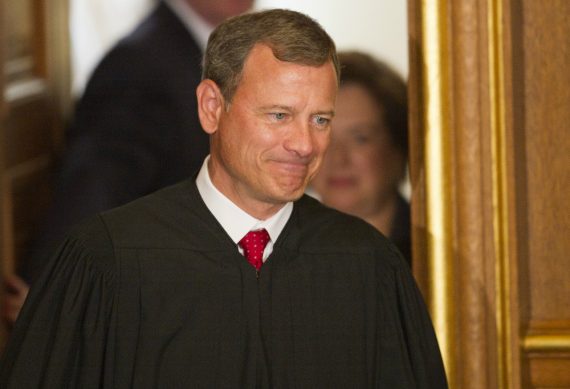The Roberts ObamaCare Decision: The Epitome Of Judicial Restraint
In his ruling on the ObamaCare cases, Chief Justices Roberts reached back to a judicial philosophy with roots in men like Oliver Wendell Holmes, Jr. and Felix Frankfurter.
One of the biggest subjects of speculation over the past day has been the question of how Chief Justice Roberts ended up in a majority with the Supreme Court’s four liberal members and making a ruling that upheld the Constitutionality of the Affordable Care Act while his four conservative colleagues (and swing vote Anthony Kennedy) were on the other side. Some have speculated that Roberts did this to protect the dignity of the Court, but that would require one to believe that Roberts knowingly signed on to an opinion he didn’t agree with for political reasons. Even if one believes that the Justices are, in some sense, political actors, it’s a stretch to argue that they take positions they disagree with for political reasons. Others have speculated that Roberts switched his vote for some reason. And, some of the crazier people on the right have even suggested that Roberts was threatened somehow by some unknown force. In the end, only the Chief Justice can explain his reasons for how he voted in this case, but, Damon Root offers this explanation:
Chief Justice John Roberts also believes in judicial restraint, or judicial modesty, as he described it during his 2005 Senate confirmation hearings, and that belief came shining through yesterday in his majority opinion in National Federation of Independent Business v. Sebelius. Although Roberts rejected the Obama administration’s novel claim that Congress may force Americans to buy health insurance as part of its power to regulate interstate commerce, he nonetheless found the health insurance mandate to be lawful under a different constitutional provision, Congress’ power to “lay and collect taxes.”
“The text of a statute can sometimes have more than one possible meaning,” Roberts wrote, before proceeding to embrace the only possible meaning that would allow the statute to survive. “The Government asks us to interpret the mandate as imposing a tax, if it would otherwise violate the Constitution,” he continued. “Granting the Act the full measure of deference owed to federal statutes, it can be so read.”
And so judicial restraint reared its head. In fact, as an authority for his deferential maneuvering, Roberts turned to none other than Justice Holmes, citing the famous jurist’s concurring opinion in the 1928 case of Blodgett v. Holden, which declared, “between two possible interpretations of a statute, by one of which it would be unconstitutional and by the other valid, our plain duty is to adopt that which will save the Act.”
In other words, the tie goes to the government.
I’m not sure that I would put it that way. I think the better way to put it is that Court’s should be careful about declaring legislation unconstitutional to begin with and that, if there is a Constitutional theory under which the law can be upheld then the preference would be to uphold the law rather than striking it down under some other theory. It’s worth noting that the argument that Roberts adopted in his opinion was not novel. It had been advanced by some legal analysts from the time the PPACA became law, and was included in every single brief that the Solicitor General or his deputy filed with a Court defending the validity of the law. It didn’t get much attention, though, because most of the attention was being paid to the Commerce Clause issue, where there was clear disagreement and the potential for a debate on the scope and power of government. The tax argument was still out there, though, available to any court that chose to adopt it. That’s what Roberts did yesterday. I’m not entirely certain it’s correct, and I think there are implications to the decision that raise just as many concerns as a decision based on the Commerce Clause would have. However, I think it’s essential to recognize that what Roberts, whether you think he was correct or not, was the epitome of judicial restraint.
There’s actually much confusion, both among lay people and it seems among political pundits about what judicial restraint actually is. It gets confused quite often, it seems, with the related but not entirely identical doctrine of originalism, but there are significant differences between the two. Put in lay terms, originalism is essentially the idea that Judges should interpret the Constitution in accordance with its plain meaning and the intentions of the founders. Judicial restraint, on the other hand, is the idea that judges should exercise their power with caution and that a law that has been duly passed by the Legislative Branch should be given due deference and should only be struck down as unconstitutional if there is no plausible theory under which the law can be upheld. One can be both an originalist and a believer in judicial restraint, and the primary example of such a judge would be Robert Bork who has written many times about the deference he believes that Courts should give to legislative majorities. One can also be a believer in judicial restraint and a legal “liberal,” and the primary example of that type of judge would be someone like Oliver Wendell Holmes, Jr. and Felix Franfurter, who were strident voices against Supreme Court decisions that struck down social legislation in the name of “substantive due process.”
Despite the obviously different politics of men like Roberts, Holmes, and Frankfurter, one can say that judicial restraint is a conservative view of how a judge should do his or her job. Not conservative in the political sense so much as in the sense that it is a view that says that Judges should not be radically striking down laws they dislike that might otherwise be Constitutional. Now, obviously, there are different interpretations of what “judicial restraint” actually is, and it is often in the eye of the beholder, however in the classic sense of a judge who believes they should restrain themselves from second guessing the legislature, the Chief Justice’s opinion yesterday is exactly what judicial restraint is all about.







I think that is likely right. I imagine Roberts also knows that by writing it thus, the issue remains a political issue that will ultimately be decided in November.
I have to admit, I find the opinion a bit curious in the way it threads the needle, but I agree that this looks more like a principled stance about judicial restraint than in does some weird bank-shot about the Commerce Clause.
Of course, if Roberts is so principled in support of judicial restraint, it is harder to understand his willingness to override long-standing precedent and clear legislative intent on guns and campaign cash.
@Bernard Finel:
Because, contrary to the left wing talking points, he didn’t override long-standing precedent on either?
@Stormy Dragon: Roberts is like that Batman villain, two-face. He flips a coin, if the unmarred side comes up, he chooses to become a force for good, if the marred side comes up, he sets out to destroy the Republic.
Stormy, I beg to difer. The notion that the 2nd Amendment is an individual right to bear arms is wholly at odds with previous precedent. It may reflect original intent. Indeed, I personally think that the 2nd Amendment probably does reflect an individual right, but this was not the judgment of the Court for 80 years, and gun laws were passed all over the country relying on this alternative interpretation.
Similarly, campaign laws — such as Montana’s for instance — have been in place for 100 years. And the Court had never ruled that they were unacceptable until Citizens. Again, we can debate whether this was a correct decision or not. But Citizens United did overturn existing precedent.
I’m not sure what fine points of disagreement Doug has with this, but I agree with it:
Roberts never actually states that the mandate is a tax, his conclusion is that it “may reasonably be characterized as a tax”:
The government only wins by virtue of a presumption, really no different than someone being found not gulity in a murder case, who might still be a murderer.
@Bernard Finel:
Which precedent is that? The only case prior to Heller to really address the second ammendment was Miller, which didn’t address one way or the other what sorts of people the right applies to, only what sort of weapons the right applies to. You can certainly point to a lot of scholars willing to argue it should be considered a collective right, but that doesn’t constitute precedent.
And the laws that were in place for hundereds of years are still in place. Citizen’s United did not impact any of the long standing laws limiting contributions to candidates, only the relatively recent laws governing independent expenditures, an area that was not covered by previous precedent.
@PD Shaw:
Come on, again there were plenty of ways to legislate which did not use the tax form.
There are fines, inspections, penalties, regulations, etc., etc.
On the other hand, the ONLY way to make it a tax, was to make it a tax you pay, on your tax form.
(Maybe “shorter Roberts” is “Conservative that I am, I cannot find a way to call this tax anything but a tax.”)
The First Amendment did not apply to states 100 years ago. That began in 1925.
The Court ruled ruled that Massachusett’s prohibitions on corporate spending to influence voters were unconstitutional in 1978 in First National Bank of Boston v. Belloti.
Hold on. The reasoning in Miller makes clear that judgments about types of weapons are a function of the militia function, not the individual’s right. But more generally, the lack of case law is precisely the point. The right of states to regulate gun — in some cases quite substantially — was accepted as a given. Now, I agree that with the Court that the 19th C cases are obsolete, but until Heller, it was so widely accepted that states could limit individual ownership that no cases were taken up.
In terms of campaign finance — the law that was just thrown out was 100 years old. The Montana Corrupt Practices Act of 1912. Yes, laws about individual contributions are still in place… for now. But again, more broadly, the notion that Citizens has not dramatically transformed the political landscape is empirically false. This election cycle has been, and will continue to be, dominated by expenditures that are only allowed by dint of Citizens United.
The ObamaCare backers insisted, from the day it was introduced right up until arguments before the Supreme Court, that it was not a tax. No way, no how, nuh-uh, never, pinkie-swear, vow on their grandmothers’ graves it was not a tax. And man oh man, Roberts would be the greatest traitor in the history of the nation if he didn’t give his approval to ObamaCare — which was not a tax, no way, etc.
Roberts then went in and essentially rewrote the law to say it is a tax, and the backers were complete and utter incompetent idiots all the time for insisting that it wasn’t a tax.
Now he’s a hero for calling them an idiot.
The one advantage is that the requirements for repealing a tax are lots simpler than a non-tax…
@Jenos Idanian #13:
I’ll give you this: It was really odd for the Obama team to structure it as a tax for Constitutional reasons, and then not be more up-front about that.
But certainly many of us argued it was Constitutional as a tax from day one.
@PD Shaw:
I simply thought that to express it as “the tie” goes to the government wasn’t an entirely accurate way to express the Holmes/Roberts view on deference to the legislature
@Bernard Finel:
Saying that the firearm in question has to have a martial function to be covered is not the same as saying the person wielding it has to be acting in military role.
And as typical, you misrepesent the ruling in Heller. From the ruling:
The states are still free to limit individual ownership in all manner of ways, short of a total ban.
This is what Obama gets for utilizing a conservative Republican Heritage Foundation idea like an insurance mandate. It is confusing. Many people thought that conservatives supported their own ideas? I guess they do until a Democratic president wants to implement them.
The alternative facing Roberts was staring him in the face — in the dissent (that may or may have started as the majority opinion) which simply wiped away the whole act and perhaps may be eviscerated most post 1929 federal government social programs as well. Like Republicans in Congress, conservatives in the court shot for the whole enchillada, and ended up with nothing.